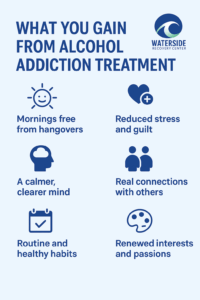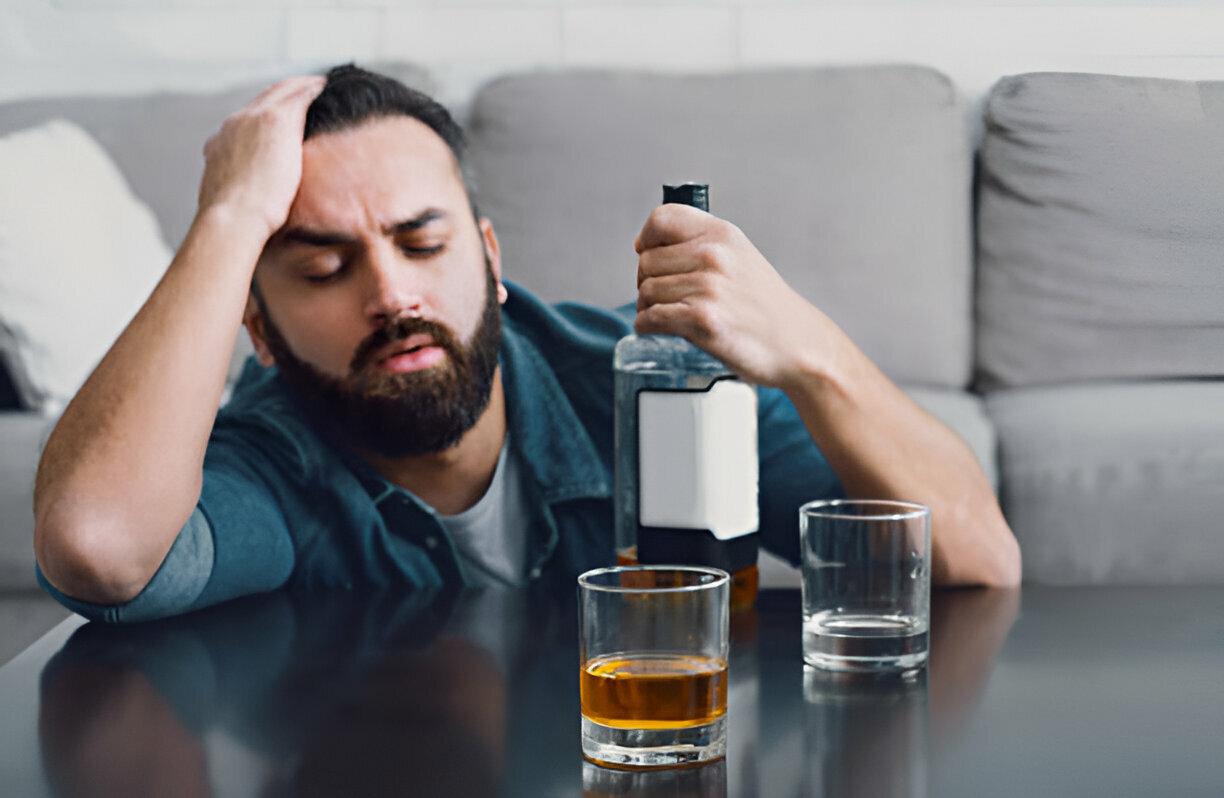If you’ve been wondering whether alcohol addiction treatment is worth it, you’re not alone. Many of us feel stuck, uncertain, even scared—especially the first time. At Waterside Recovery’s alcohol addiction treatment program, we understand the courage it takes just to ask the question. In this blog, we’ll paint a full picture of sober life—so you can see what’s waiting if you decide to start this week.
This isn’t about being “fixed.” It’s about rediscovering yourself and building a life that makes your heart quiet—not loud.
1. Your Morning, Reclaimed
Waking up without a hangover is more than just feeling well-rested. It’s freedom. Instead of scrambling to find water and Advil, you wake up gently. You might notice the warmth of sunlight, the quiet hum of morning. Without regret haunting you, you begin grateful for the day ahead.
It’s simple, but radical: breakfast tastes good again. That first sip of coffee doesn’t come with a side of anxiety. Blankets seem cozy. Mornings feel safe. And slowly, those moments add up to hope.
2. Your Body Says “Thank You”—Fast
We often underestimate the toll alcohol takes on our bodies. In alcohol addiction treatment, your system finally gets the space it needs to heal:
- Sleep quality improves—your brain starts repairing overnight.
- Energy levels increase—no more crashing midday.
- Skin clarity returns—your body isn’t dehydrated all the time.
- Mood stabilizes—you’re not riding the buzz-and-crash cycle.
In just a few weeks, your body reminds you of what it feels like to work well. That morning coffee isn’t fueling a hangover—it’s adding to a day you’re already strong enough to handle.
3. A Calmer, Clearer Mind
Alcohol numbs feelings—and that means it distorts reality. When you stop, emotions come back. But they’re no longer overwhelming. They’re clearer.
In treatment, you learn how to:
- Recognize triggers instead of being blind‑sided.
- Breathe through stress instead of reacting.
- Process anger without exploding.
- Sit with grief without drowning.
You don’t learn to be happy all the time. You learn to feel everything—and to know it won’t break you.
4. Real Connections, Without the Bottle
Drinking often becomes a language we use to fit in. But recovery gives you a different dialect—one with honesty, empathy, and shared experience.
- Group therapy creates space to say things you didn’t know how to voice.
- Peer support reminds you you aren’t alone in silent mornings.
- Healthy friendships start to form where trust lasts longer than hangovers.
You won’t be surrounded by “cheers” and clinking glasses. You’ll be surrounded by understanding—and that feels better than any buzz.
5. Routine You Can Build On
Alcohol ruins routines. It makes you late, it leaves gaps, it steals momentum. Treatment helps you:
- Wake up on time.
- Eat regular, nourishing meals.
- Sleep without racing thoughts.
- Exercise, meditate, reconnect with your body.
These habits lead to results: you sleep better, you think better, you hold yourself to your own standard—and that builds confidence.
6. Rediscovering Passions and Interests
Many people hide their hobbies behind alcohol. In recovery, you’ll find things you once loved—or discover new ones:
- Hiking without feeling tired.
- Journaling honestly.
- Painting, reading, biking.
- Rebuilding creativity without self-judgment.
Your life becomes a blank canvas again. And the brush is in your hand.

7. Relief from Shame and Guilt
Addiction often comes with a heavy load of regret. “What did I say yesterday? What did I miss?” That shame follows you. Every decision is colored by self-criticism.
In treatment, you start lifting that weight through:
- Honest conversations, without judgment.
- Learning from mistakes, without self-hate.
- Forgiving yourself, layer by layer.
You begin to accept that you’re human—and that imperfect is enough.
8. Tools to Manage Stress and Triggers
Stress doesn’t disappear in sobriety—it becomes visible. In recovery, you learn to:
- Identify your personal triggers.
- Practice calming techniques in real time.
- Build a toolkit: breathing methods, check-ins, affirmations.
- Plan ahead: “If I face stress, I’ll do X not drink.”
You begin to trust yourself. Hard days don’t have to trip you up.
9. Renewed Relationships and Communication
Relationships often carry the hardest load of addiction. You might want to reconnect but don’t know how.
Treatment gives you space to:
- Learn how to apologize in ways that feel true.
- Practice listening without defensiveness.
- Rebuild patterns of trust—brick by brick.
- Show up without needing alcohol to ease the conversation.
You can start handling conflict better. You can ask for help without feeling ashamed.
10. A Vision for Tomorrow
When you start alcohol addiction treatment this week, you’re planting a seed. What grows in weeks becomes roots in months—and in a year, you have a different landscape:
- You laugh freely.
- You handle stress without drinking.
- You wake up excited about small things.
- You carry hope—real hope.
Every morning without regret, every stress you managed, every relationship you healed: these are signs of a life rebuilt.
Frequently Asked Questions (FAQs)
1. How long does alcohol addiction treatment take?
Length varies. Outpatient programs may span 30‑90 days. Some in-depth residential options are 60 days or more. Many people continue aftercare as a lifetime path to sustaining gains.
2. Will I have to detox in a hospital?
For heavy alcohol users, medically supervised detox in a hospital or treatment facility may be safest. For lighter use, tapering under medical supervision may suffice. Waterside Recovery’s medical team will assess and recommend what you need for safety and comfort.
3. Will I have to attend lectures all day?
No. Most programs mix group therapy, individual counseling, medical check‑ins, wellness activities, and life‑skills sessions. Expect structure—but also space for creativity, connection, and rest.
4. How do I pay for treatment?
Many insurance plans cover alcohol addiction treatment. Waterside Recovery can help verify insurance coverage. Financing options may also be available for those who need them. Financial conversations always happen in confidence.
5. Is treatment the same as 12-step?
12-step programs are one form of recovery support. Waterside Recovery offers a holistic model that may include 12-step, CBT, trauma-informed care, mindfulness, family therapy, and more. You choose what fits you best.
6. What happens after treatment ends?
Aftercare is essential. It may include outpatient check-ins, support groups, alumni events, therapy, or sober living. It’s not just a transition; it’s a bridge into the life you’re rebuilding—with steady support.
A Memorable Line
Imagine your life as a ship lost at sea. Alcohol is the storm—it clouds your vision, tosses you around, makes you wonder if any shore is reachable. Treatment isn’t a quick wind. It’s the lighthouse. It guides you steadily home.
You Don’t Have to Wait Another Day
Every hour you delay is another day stuck in a pattern you didn’t choose. Every moment you start is a step toward freedom—calm, clarity, connection. You deserve mornings that don’t hurt. You deserve days where you mean what you do—and do what you mean.
Call (866) 671‑8620 to learn more about our alcohol addiction treatment services in Plymouth County, MA. Let’s walk this path together—one day, one breath, one step at a time.


